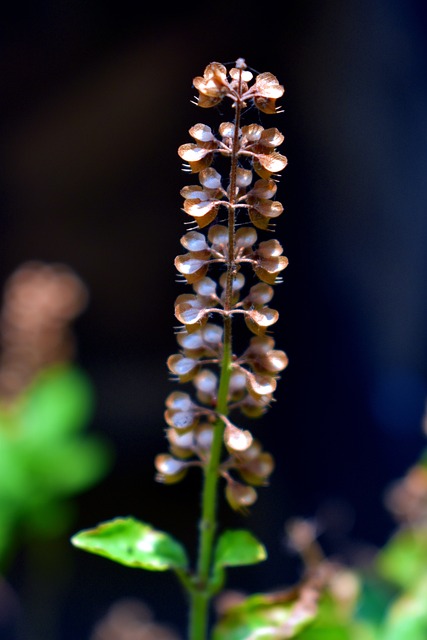
Holy basil (Ocimum tenuiflorum), an ancient Indian herb, is also known as “tulsi.” This form of basil gained its name due to its highly revered status in Hinduism. It’s been used for an incredibly wide range of purposes throughout history, ranging from spiritual to medicinal to material. In the West, researchers are beginning to investigate holy basil benefits in detail.
Below are some scientifically proven as well as traditional holy basil benefits. If you’re seeking to treat an ailment, always consult with a medical professional first as the remedies described below are not definitive.
1: Adaptogenic Properties
Holy basil falls into the category of “adaptogenic” herbs. These are versatile plants that improve the body’s natural ability to respond to external stressors. When stress would otherwise hurt your physical and emotional health, adaptogens help your body stay balanced and healthy.
2: Immune Support
One of the most common holy basil benefits is supporting the immune system, helping your body fend off common illnesses. This herb has traditionally been used to fight common infections like flu and colds. It is a known antiviral, antibacterial, and decongestant, and is useful for respiratory ailments.
Recent preliminary research shows that holy basil does indeed seem to cause immune cells — known as T helper cells — to proliferate, while also increasing your body’s level of “natural killer cells.” This would allow your system to fight off infections more easily. About 500mg taken twice daily should be sufficient.
3: Reduces Stress, Anxiety, and Depression
In Ayurveda as well as in Western herbalism, holy basil is used to remove sluggishness and improve mood. This makes it useful for aiding concentration and reducing depression, stress, or attention disorders.
Indeed, recent researchers have found that holy basil is effective in people with diagnosed anxiety. When taken in extract form twice daily after meals, holy basil reduces anxiety as well as associated depression and stress. Still, because research is still preliminary, it’s not clear exactly how much holy basil can reduce stress. It’s best to use it in conjunction with other treatment methods.
Herbalists often prescribe holy basil as a tea or tincture to reduce stress.
4: Prevents Cancer
Amazingly enough, some of the scientific research on holy basil has studied its usefulness as a cancer preventative. The seed oil specifically seems to contain certain antioxidant compounds that slow the progression of cancer, as shown in animal trials, and also improve the survival rate of those with certain types.
These include skin, lung, oral, and liver cancers that chemicals can create or develop. Holy basil may also protect against radiation-related illnesses.
5: Treats Skin Rashes
As an anti-inflammatory, holy basil benefits the skin in various ways. People have always used this plant to treat rashes and skin inflammations. This includes poison oak or poison ivy rashes along with ringworm. To treat these conditions, one must topically apply holy basil as a poultice or extract rather than consume it orally or internally.
6: Prevents Liver Damage
Holy basil benefits the liver, particularly by preventing external toxins from causing damage to this organ. Compounds in holy basil leaves seem to stabilize the cell membranes in the liver, allowing it to easily withstand the effects of toxins without becoming compromised.
Research showed effects with a dose of 100 to 200mg for each kilogram of body weight. Holy basil benefits are even more potent when used with milk thistle, another herb that protects the liver.
7: Lowers Blood Sugar
Holy basil benefits people with type 2 diabetes as well, according to recent studies. Preliminary research showed noticeable and promising results. Diabetic patients who took holy basil not only experienced a decrease in blood sugar but also in LDL cholesterol and triglycerides. This was with a dose of 1,000mg to 2,500mg of holy basil per day. You can use either extract or powder.
8: Prevents Asthma Attacks
Holy basil is a promising natural treatment for people with asthma. In recent studies, people experienced improved breathing function and had fewer asthma attacks when they took 500mg of holy basil three times a day. This could be a huge improvement in the quality of life for people who have suffered from lifelong asthma.
9: Relieve Stomach Upset
As a member of the mint family, holy basil can also balance the digestive system due to its healing properties. It can stimulate your appetite as well as improve the movement of food throughout your system, allowing you to digest the ingested food easily.
While there isn’t much research on this usage, Indian herbalists have been using holy basil for this purpose for thousands of years, and many mint plants — cousins of holy basil — have been studied for their ability to settle the stomach. Tea or tincture is best for this purpose.
10. Anti-Inflammatory Effects
Due to its anti-inflammatory properties, many people also use the holy basil plant to ease the symptoms of common inflammatory diseases, though there’s not yet much scientific research for this specific purpose. It may be useful for those with arthritis, fibromyalgia, or other joint issues.
11. Insect Repellent
All over South Asia, people traditionally use holy basil to repel mosquitoes and other insects. For this purpose, one must rub the dried or fresh leaves directly onto the skin. This may not work as well as some more potent methods, but it’s an all-natural solution for discouraging bugs. Since the oils in holy basil leaves are rather astringent, it makes sense that bugs wouldn’t be too keen to get near them.
Summing It Up
The many holy basil benefits are so diverse that it quickly begins to make sense why Ayurvedic practitioners call this the “Queen of Herbs.” People all over the world consume this plant for a seemingly never-ending list of purposes, with many people taking it daily simply to keep illnesses at bay. With research beginning to back up holy basil’s usefulness, it’s a good idea to become familiar with this impressive herb.
